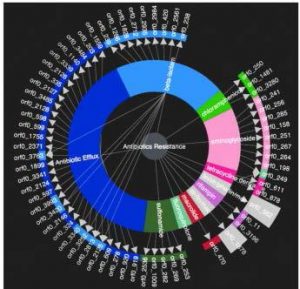Comprehensive Antibiotic Resistance Database (CARD)

Tech ID
15-055
Inventors
G. Wright
A. McArthur
Website
Commercial Enquiries
Contact
Rimika Sachdeva
Business Development Officer
Overview
The CARD is an ontology- and model based framework for detection of antibiotic resistance genes. It contains an expert-curated collection of characterized, peer-reviewed resistance determinants and associated antibiotics, organized by the Antibiotic Resistance Ontology (ARO) and AMR gene detection models. The software utilizes these detection models for predicting AMR from genome sequences.
Other associated tools include the Resistance Gene Identifier (RGI) which is a novel genome analysis tool for resistome prediction. It annotates DNA and protein sequences and detects matches to CARD reference sequences, variants of known AMR genes and emergent threats.
Resistomes is a computer-generated data set including genome annotation and variants data using RGI for 85 pathogens of interest. For each of these pathogens, complete chromosome sequences, plasmid sequences, and whole genome shotgun assemblies were analyzed individually by RGI to generate prevalence data. Results are further categorized using the ARO.
Benefits
- Expert-curated database that is updated regularly.
- Software for prediction of resistance genes from isolates or metagenomic samples from clinical, environmental, or agricultural samples.
Applications
- Predict antimicrobial resistance (AMR) from genome sequences
- Metagenomic analysis
- Pathogen of origin prediction
- Prevalence of AMR determinants
- Regulatory submissions and product registration for agricultural products
- Commercial services to analyze genomes
- Understanding molecular mechanisms of drug resistance, particularly drug development
Copyright
Unrestricted research use of CARD and all associated data and tools is available to non-profit organizations, governments or universities. All commercial entities must seek to obtain a non-exclusive license by filling out the License Request Form.
References
Alcock, P., Huynh, W., Chalil, R. et al. CARD 2023: expanded curation, support for machine learning, and resistome prediction at the Comprehensive Antibiotic Resistance Database. Nucleic Acids Res. 2023 Jan 6;51(D1):D690-D699. doi: 10.1093/nar/gkac920.
[CARD-L] Comprehensive Antibiotic Resistance Database – Updates
December 2024
This major update includes several new data sets, new download files, and technical improvements:
- Over 1200 new beta-lactamase genes (a several new families) have been added to CARD. In addition, classification of beta-lactam molecules has been re-organized (and additional antibiotics added) to reflect functional groups: monobactams, penicillins, early (1st-2nd generation) cephalosporins, extended-spectrum (3rd-generation) cephalosporins, carbapenems, 4th generation cephalosporin cefepime, 5th generation cephalosporin ceftaroline, and updated beta-lactamase plus inhibitor combinations.
- Over 1400 new Mycobacterium tuberculosis mutations conferring AMR have been added via curation & cross-referencing of the ReSeqTB, CRyPTIC, and WHO 2023 mutation catalogs. This includes addition of 29 new M. tuberculosis drug targets. A new interface has been provided for easy assessment of level of evidence for each M. tuberculosis mutation from the literature and the three catalogs. Thanks to our TB curation team: Brian Alcock, Monica Warner, Karyn Mukiri, Sidrah Shaikh, & Nilasha Mohan.
- The recently released FungAMR catalog including over 50,000 mutations across 184 antifungal molecules and 92 fungal species have been added to CARD as a searchable interface. Full incorporation of these data into CARD is ongoing. Thanks to Bédard et al. for sharing these data (see https://www.biorxiv.org/content/10.1101/2024.10.07.617009v1).
- Our chemistry curation team is currently adding SMILES, PubChem, ChEBI, ChEMBL, and CAS data for every molecule in CARD, with some of these data now available. New download files and tools will be provided once this curation is complete.
- Mutation data in CARD has been updated to reflect the Human Genome Variation Society (HGVS) nomenclature, with additional rules from GARC (a Grammar for Antimicrobial Resistance Catalogues). The HGVS Nomenclature is an internationally recognized standard for the description of DNA, RNA, and protein sequence variants. It is used to convey variants in clinical reports and to share variants in publications and databases.
- Additional resistomes data have been provided by the Canadian Genomics R&D Initiative on AMR One Health, via NCBI BioProject PRJNA1076250.
- For laboratory work, the CARD metagenomics Bait Capture Platform has been updated to reflect these latest curation updates and information on the Antibiotic Resistance Platform (ARP) for direct antibiotic susceptibility testing of individual resistance determinants or antibiotic & adjuvant discovery dereplication is provided.
- CARD’s search box now enables searches based on associated publications (PMID) or NCBI sequence accessions. The SNPs download file now includes source of evidence and citation. A new download file is also provided that cross-references Antibiotic Resistance Ontology (ARO) terms with citations.
February 2024
- This update includes addition of gyrA, gyrB, and folp mutations for additional Salmonella species, 23S rRNA mutations for Treponema pallidum, and gyrA mutations for Helicobacter pylori. It also includes addition of OXA beta-lactamase sub-families, with subsequent re-organization of the OXA beta-lactamase classification.
October 2023
- This update includes improved curation of 16S rRNA mutations, the addition of TEM and OXA beta-lactamase sequences, improvements in tet gene curation, additional aminoglycoside resistance genes, and improvements to antibiotic and drug class curation. In addition to the database, the Resistance Gene Identifier software has been updated to use BLAST 2.14.0, with config file, and adds HSP subject coordinates and impacted antibiotics to output. https://github.com/arpcard/rgi
June 2023
- The in silico Resistomes, Variants, & Prevalence data set has been updated to 381 pathogens, 24291 chromosomes, 2662 genomic islands, 48212 plasmids, 172216 WGS assemblies, 276270 alleles based on sequence data acquired from NCBI on May 2, 2023 and Islandviewer 4, analyzed using RGI 6.0.2 (DIAMOND homolog detection) and CARD 3.2.7. Includes pre-compiled k-mer classifier data for pathogen-of-origin prediction.
May 2023
- CARD curation updates include continued improvements for aminoglycoside modifying enzymes, curation of Mycobacterium tuberculosis mutations, and curation of additional TEM, EBR, IND, KPC, LAQ, NDM, WUS, and IMP beta-lactamases.In addition, the CARD team are happy to announce that the Resistance Gene Identifier (RGI) has been incorporated into the Chan Zuckerberg ID platform for free, cloud-based metagenomics analysis by researchers, allowing high-throughput use of RGI’s read-mapping algorithms online: https://chanzuckerberg.zendesk.com/hc/en-us/articles/15091031482644-AMR-Pipeline-Workflow

